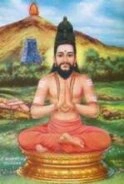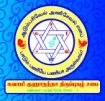

திரு அருணகிரிநாதர் அருளிய
திருப்புகழ்
Sri AruNagirinAthar's
Thiruppugazh

 |  திரு அருணகிரிநாதர் அருளிய Sri AruNagirinAthar's |  |
|---|
| (இந்த வலைத்தளத்தைப் பயன்படுத்துவதற்கு முன்பு எனது முக்கியக் குறிப்பைப் படியுங்கள் - நன்றி). (Please read my important note before using this website - Thank You). |
| திருப்புகழ் 561 வாசித்து (திருசிராப்பள்ளி) Thiruppugazh 561 vAsiththu (thiruchirAppaLLi) |
 |  | தமிழிலும் ஆங்கிலத்திலும் பொருள் எழுதியது ஸ்ரீ கோபால சுந்தரம் Meanings in Tamil and English by Sri Gopala Sundaram | English PDF அமைப்பு in PDF | ஆலய வரிசை அகரவரிசை எண்வரிசை தேடல் venue list alphabetical numerical search |
|
தானத்தத் தான தானன தானத்தத் தான தானன தானத்தத் தான தானன ...... தந்ததான ......... பாடல் ......... வாசித்துக் காணொ ணாதது பூசித்துக் கூடொ ணாதது வாய்விட்டுப் பேசொ ணாதது ...... நெஞ்சினாலே மாசர்க்குத் தோணொ ணாதது நேசர்க்குப் பேரொ ணாதது மாயைக்குச் சூழொ ணாதது ...... விந்துநாத ஓசைக்குத் தூர மானது மாகத்துக் கீற தானது லோகத்துக் காதி யானது ...... கண்டுநாயேன் யோகத்தைச் சேரு மாறுமெய்ஞ் ஞானத்தைப் போதி யாயினி யூனத்தைப் போடி டாதும ...... யங்கலாமோ ஆசைப்பட் டேனல் காவல்செய் வேடிச்சிக் காக மாமய லாகிப்பொற் பாத மேபணி ...... கந்தவேளே ஆலித்துச் சேல்கள் பாய்வய லூரத்திற் காள மோடட ராரத்தைப் பூண்ம யூரது ...... ரங்கவீரா நாசிக்குட் ப்ராண வாயுவை ரேசித்தெட் டாத யோகிகள் நாடிற்றுக் காணொ ணாதென ...... நின்றநாதா நாகத்துச் சாகை போயுயர் மேகத்தைச் சேர்சி ராமலை நாதர்க்குச் சாமி யேசுரர் ...... தம்பிரானே. ......... சொல் விளக்கம் ......... வாசித்துக் காணொ ணாதது ... நூல்களைக் கற்று கலையறிவால் காணமுடியாததும், பூசித்துக் கூடொ ணாதது ... பூஜை செய்து கிரியாமார்க்கத்தால் அடைதற்கு அரியதும், வாய்விட்டுப் பேசொ ணாதது ... வாக்கினால் இத்தன்மைத்து எனப் பேசமுடியாததும், நெஞ்சினாலே மாசர்க்குத் தோணொ ணாதது ... உள்ளத்தில் குற்றமுடையோருக்குத் தோன்றி விளங்காததுவும், நேசர்க்குப் பேரொ ணாதது ... அன்பு செய்தார் நெஞ்சினின்றும் நீங்காது நிற்பதுவும், மாயைக்குச் சூழொ ணாதது ... மாயையினால் சூழமுடியாததும், விந்துநாத ஓசைக்குத் தூர மானது ... விந்து (சக்தி) சுழல அதனின்று எழும் நாதம் (சிவம்) என்னும் ஓசைக்கு அப்பால் வெகு தூரத்தில் இருப்பதுவும், மாகத்துக் கீற தானது ... ஆகாயத்திற்கு முடிவிலே இருப்பதுவும், லோகத்துக் காதி யானது ... இவ்வுலகத்திற்கு ஆதியானதுவும் ஆகிய மெய்ப்பொருளை, கண்டுநாயேன் ... உள்ளக் கண்களால் நாயேன் கண்டு, யோகத்தைச் சேரு மாறு ... சிவயோகத்தை அடையுமாறு மெய்ஞ் ஞானத்தைப் போதி யாய் ... உண்மை அறிவை நீ உபதேசித்து அருள்வாய். இனி யூனத்தைப் போடி டாது ... இனி யான் இந்த உடம்பை வெறுத்து ஒதுக்காது மயங்கலாமோ ... மாயை வசப்படலாமோ? ஆசைப்பட்டு ஏனல் காவல்செய் ... நீயே மிக விரும்பி, தினைப்புனம் காவல் செய்த வேடிச்சிக் காக மாமயலாகி ... வேட்டுவப் பெண் வள்ளிக்காக பெரிதும் மயங்கி, பொற் பாத மேபணி கந்தவேளே ... பொன் போல் ஒளிரும் அவள் பாதத்தில் வீழ்ந்து வணங்கிய கந்தக் கடவுளே. ஆலித்துச் சேல்கள் பாய் ... ஆரவாரித்து சேல்மீன்கள் பாய்ந்து விளையாடுகின்ற வய லூரத்தில் ... வயலூர் என்னும் திருத்தலத்தில் எழுந்தருளி, காள மோடு அடர் ஆரத்தைப் பூண் ... விஷம் நிறைந்த பாம்பை மாலையாகப் பூண்ட ம யூர துரங்கவீரா ... மயிலாகிய குதிரை மீது பவனிவரும் வீரனே, நாசிக்குட் ப்ராண வாயுவை ... நாசியின் வழியாக பிராணவாயுவை ரேசித்தெட் டாத யோகிகள் ... வெளியேவிட்டு, மீண்டும் பூரகம் செய்து ஹஸ்ராரப் பெருவெளியை* எட்டமுடியாத தவயோகிகள் நாடிற்றுக் காணொ ணாதென ... எத்தனை விரும்பியும் காணமுடியாதபடி நின்றநாதா ... (அப்பாலுக்கு அப்பாலாய்) நின்ற தலைவனே, நாகத்துச் சாகை போய் ... மலையின் கிளைச் சிகரம் வளர்ந்து சென்று உயர் மேகத்தைச் சேர் சிராமலை ... உயர்ந்த மேகமண்டலத்தைச் சேரும் திரிசிராமலையில் நாதர்க்குச் சாமி யே ... எழுந்தருளியுள்ள சிவபெருமானுக்கு குருஸ்வாமியே, சுரர் தம்பிரானே. ... தேவர்களுக்குத் தலைவனே. |
* இங்கு சிவயோக முறைகள் விளக்கப்பட்டுள்ளன. அதன் சுருக்கம் வருமாறு: நாம் உள்ளுக்கு இழுக்கும் காற்றுக்குப் 'பூரகம்' என்றும், வெளிவிடும் காற்றுக்கு 'ரேசகம்' என்றும் பெயர். உள்ளே நிறுத்திவைக்கப்படும் காற்றுக்கு 'கும்பகம்' என்று பெயர். உட் கொள்ளும் பிராணவாயு உடலில் குறிப்பிட்ட 'ஆதாரங்கள்' (நிலைகள், சக்கரங்கள்) மூலமாகப் படிப்படியாகப் பரவி, மேல் நோக்கிச் சென்று, தலையில் 'பிரம கபால'த்தில் உள்ள 'ஸஹஸ்ராரம்' (பிந்து சக்கரம்) என்ற சக்கரத்துக்குச் செல்லும். இந்த ஐக்கியம் ஏற்படும்போது, அமுத சக்தி பிறந்து, ஆறு ஆதாரங்களுக்கும் ஊட்டப்பட்டு, மீண்டும் அதே வழியில் 'மூலாதார'த்தை வந்து அடையும். இந்த ஆதாரங்களை ஒழுங்கு படுத்தும் வகையில் மூன்று 'மண்டல'ங்களும் (அக்கினி, ஆதித்த, சந்திர மண்டலங்கள்), பத்து 'நாடி'களும் (இடைகலை, பிங்கலை, சுழுமுனை முதலியன) உள்ளன. 'இடைகலை' பத்து நாடிகளுள் ஒன்று. இடது நாசியால் விடும் சுவாசம். 'பிங்கலை' பத்து நாடிகளுள் ஒன்று. வலது நாசி வழியால் விடும் சுவாசம். 'சுழு முனை' இடைகலைக்கும் பிங்கலைக்கும் இடையில் உள்ளது. 'சுழு முனை' ஆதாரம் ஆறிலும் ஊடுருவி நிற்பது. 'இடைகலை'யும், 'பிங்கலை'யும் ஒன்றுக்கொன்று பின்னி நிற்பன. சுவாச நடப்பை 'ப்ராணாயாமம்' என்ற யோக வன்மையால் கட்டுப்படுத்தினால் மன அமைதி ஏற்படும். |
| 'wikisource' reference links for this song இப்பாடலுக்கான 'விக்கிமூலம்' இணையப் பக்கங்கள் pg 1.839 pg 1.840 pg 1.841 pg 1.842 WIKI_urai Song number: 343 goto wiki alpha list (Please note: Kaumaram.com is NOT responsible for accuracy and contents of external links) |
 |
கௌமாரம் குழுவினர் The Kaumaram Team |
 |
'குருஜி' ராகவன் அவர்களுடன் திருப்புகழ் அன்பர்கள் 'Guruji' Ragavan and Thiruppugazh Anbargal |
 |
'சிங்கப்பூர்' செல்வி சுபாஷினி 'Singapore' B. Subhashini |
| ஸ்ரீ மஹா பெரியவா திருப்புகழ் சபை & சுவாமி குஹாநந்தா திருப்புகழ் சபை (சேலம்) Sri Maha Periyava Thirupugazh Sabha & Swamy Gughanandha Thirupugazh Sabha (Salem) |
 |  |  |
 | இப்பாடலின் பொருள் meanings in Tamil |  |
 |
திரு சபா. மெய்யப்பன் Thiru S. Meyyappan |
(Please note: Kaumaram.com is NOT responsible for accuracy and contents of external links) top |
|
Song 561 - vAsiththu (thiruchirAppaLLi) vAsiththukkANo NAdhadhu pUsiththuk kUdo NAdhadhu vAyvittup pEso NAdhadhu ...... nenjinAlE mAsarkkuth thONo NAdhadhu nEsarkkuppEroNAdhadhu mAyaikku sUzhoNAdhadhu ...... vindhunAdha Osaikkudh dhUra mAnadhu mAgaththuk keeRa thAnadhu lOkaththuk AdhiyAnadhu ...... kaNdunAyEn yOgaththai sEru mARu mey nyAnaththai bOdhiyAyini yUnaththaip pOdi dAdhu ...... mayangalAmO Asaip pattEnal kAvalsey vEdicchik kAga mAmayal AgippoR pAdha mEpaNi ...... kandhavELE Aliththu sElgaL pAyvaya lUraththiR kALa mOd adar Araththaip pUNmayUra ...... thurangaveerA nAsikkuL prANa vAyuvai rEsiththet tAdha yOgigaL nAditruk kANo NAdhena ...... nindranAthA nAgaththu sAgai pOy uyar mEgaththai sErsirAmalai nAtharkku sAmi yEsurar ...... thambirAnE. ......... Meaning ......... vAsiththukkANo NAdhadhu: That cannot be perceived after any amount of studies. pUsiththuk kUdo NAdhadhu: That cannot be attained through any number of Pujas (modes of worship). vAyvittup pEso NAdhadhu: That cannot be described in words. nenjinAlE mAsarkkuth thONo NAdhadhu: That cannot be conceived in impure hearts. nEsarkkuppEroNAdhadhu: That cannot be uprooted from His devotees' hearts. mAyaikku sUzhoNAdhadhu: That cannot be surrounded by illusion. vindhunAdha Osaikkudh dhUra mAnadhu: That is beyond the reach of the Sound (nAtham) created by the churning of Energy (vindhu). mAgaththuk keeRa thAnadhu: That is at the boundary of the skies. lOkaththuk AdhiyAnadhu: That is the origin of the entire Universe. kaNdunAyEn: Having understood and seen that, the lowly myself yOgaththai sEru mARu: want to attain the Union (yOgA) with SivA; mey nyAnaththai bOdhiyAy: for that, You have to teach me the True Knowledge. ini yUnaththaip pOdi dAdhu mayangalAmO: Now I should rescind my mortal body without any illusions about it. Asaip pattEnal kAvalsey: with great desire You went to the millet-field guarded by vEdicchik kAga mAmayalAgi: the hunter-girl (VaLLi) and fell madly in love with her; poR pAdha mEpaNi kandhavELE: and knelt down at her golden feet, Oh Kandaswamy! Aliththu sElgaL pAyvaya lUraththiR: You reside in VayalUr where the fish swim about roaring in the fertile fields. kALa mOd adar Araththaip pUNmayUra: Your peacock wears the poisonous serpent as garland; thurangaveerA: You ride that peacock as if it were a horse, Oh Warrior! nAsikkuL prANa vAyuvai: Even by inhaling life giving air (oxygen-praNavAyu) through one nostril, rEsiththet tAdha yOgigaL: and exhaling it through the other nostril (PrANAyAmam)*, the great sages are still unable to attain You. nAditruk kANo NAdhu: Despite keenly desiring You, they are unable to see You ena nindranAthA: as You stand beyond their reach. nAgaththu sAgai pOy uyar mEgaththai sErsirAmalai: The peak of the Mount ThirichirAmalai rises so high as to touch the lofty clouds, nAtharkku sAmi yE: and that Mount's Lord, SivA, worships You as Guru. surar thambirAnE.: You are the Great Leader of all the DEvAs! |
* In this song, several Siva-yOgA principles are explained: The inhaled air is known as 'pUragam' and the exhaled air is 'rechagam'. The retained air is 'kumbagam'. The oxygen that enters the body climbs up step by step through several centres, known as 'chakrAs' and ultimately reaches 'sahasrAram' or 'bindhuchakram' on the top of the skull. At that point of union, nectar flows from that chakrA and seeps through and soaks the six centres of the body and returns to the basic chakrA, 'mUlAthAram'. Three zones (namely, the sun zone, the moon zone and the fire zone) and ten nerves ('nAdis') govern the six centres; the principal nerves are 'susumna', 'idaikala' and 'pingala'. idakala: one of the ten 'nAdis' (nerves), when inhalation takes place through the left nostril; pingala: one of the ten 'nAdis' (nerves), when inhalation takes place through the right nostril; susumna: one of the ten 'nAdis' (nerves), situated between the above two 'nadis', and running through the spinal chord covering all the six centres of 'kundalini'. ('idakala' and 'pingala' are entwined around 'susumna'). If breathing is controlled through a yOgA called 'praNAyAmA', the mind becomes tranquil. |
| தமிழில் PDF அமைப்பு ஆலய வரிசை அகரவரிசை எண்வரிசை |
| ... https://kaumaram.com ... The website for Lord Murugan and His Devotees முகப்பு அட்டவணை மேலே home contents top |
Kaumaram.com is a non-commercial website. This website is a dedication of Love for Lord Murugan. PLEASE do not ask me for songs about other deities or for BOOKS - This is NOT a bookshop - sorry. Please take note that Kaumaram.com DOES NOT solicit any funding, DIRECTLY or INDIRECTLY. © Copyright Kaumaram dot com - 2001-2040 COMMERCIAL USE OF MATERIAL IN THIS WEBSITE IS NOT PERMITTED. Please contact me (the webmaster), if you wish to place a link in your website. email: kaumaram@gmail.com Disclaimer: Although necessary efforts have been taken by me (the webmaster), to keep the items in https://kaumaram.com safe from viruses etc., I am NOT responsible for any damage caused by use of and/or downloading of any item from this website or from linked external sites. Please use updated ANTI-VIRUS program to rescan all downloaded items from the internet for maximum safety and security. மேலே top |